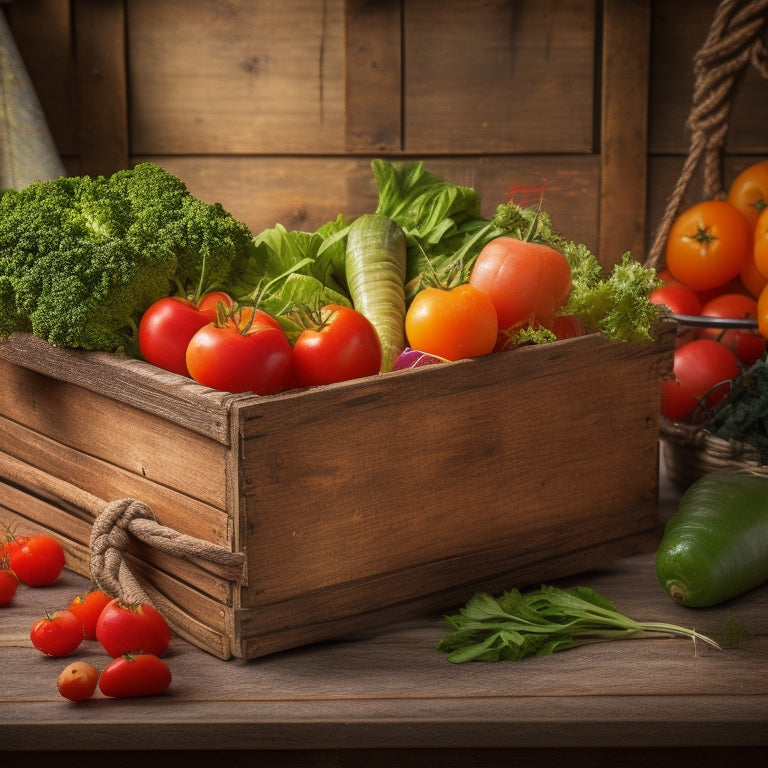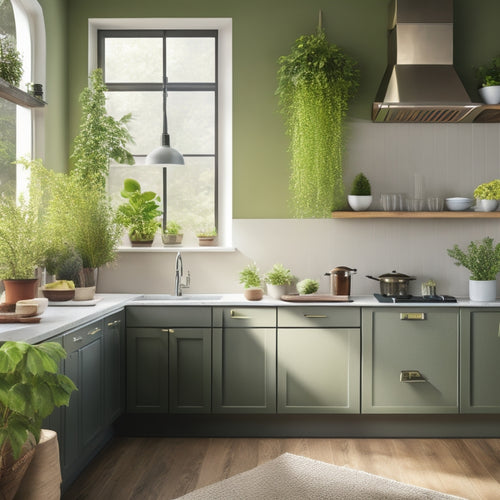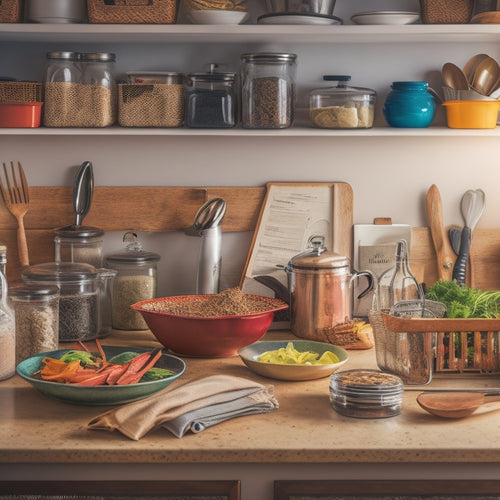
Sailors' Secrets: Fresh Veggies Savvy Storage
Share
As a sailor, I've learned that storing fresh vegetables properly is essential to maintaining a healthy diet on the water. I select veggies carefully, avoiding bruised or rotten ones, and handle them gently to prevent damage. I wash and dry them before storing in well-ventilated, dark areas to prevent moisture buildup and spoilage. Specialized storage strategies, like wrapping avocados in tube socks, help preserve individual veggies. By following these tips, I've reduced spoilage and kept my veggies fresh for longer. Now, I'm ready to share more secrets to keep your provisions fresh and your belly happy – next, I'll delve into vegetable-specific strategies.
Key Takeaways
• Carefully select fresh produce, avoiding refrigerated, bruised, rotten, or overripe items to ensure quality and longevity.
• Store veggies in well-ventilated, dry, and dark areas to prevent moisture buildup and spoilage.
• Handle veggies gently during transportation and wash them before storing to remove critters and dirt.
• Use specialized preservation techniques, such as dehydrating and vacuum-packing, to extend shelf life and prioritize essential items.
• Check stored produce daily for spoilage or mold, and utilize online resources for planning and staying updated on storage tips.
Selecting and Handling Fresh Produce
When I'm at the farmers market or veggie truck, I make sure to carefully select fresh produce that's never been refrigerated, avoiding any bruised, rotten, or overripe items that could spoil quickly.
I've learned that it's essential to handle veggies gently during transportation to prevent bruising, which can lead to spoilage. I always wash my veggies before storing them to remove any critters and dirt, and make sure they're completely dry to prevent rot.
By following these farmers market tips, I can enjoy fresh, healthy produce on the go.
Gentle transportation is key - I'll often wrap delicate items like avocados in tube socks to protect them from bruising. By taking these steps, I can store my veggies safely and enjoy them for a longer period.
Essential Storage Conditions and Tips
I store my veggies in well-ventilated, dry, and dark areas to prevent moisture buildup and spoilage. This helps maintain freshness and prevents mold growth.
Here are some essential storage tips I follow:
- Use container options that allow for air circulation, like plastic or mesh, to prevent moisture buildup.
- Opt for proper ventilation to reduce humidity and prevent spoilage.
- Check stored produce daily for any signs of spoilage or mold.
- Discard any rotting or molding items promptly to prevent contamination.
- Avoid storing non-refrigerated produce in plastic bags or airtight containers, as they can trap moisture and cause spoilage.
Vegetable-Specific Storage Strategies
Storing veggies requires attention to their unique needs, and using specialized techniques can greatly extend their shelf life.
For instance, I wrap avocados in tube socks for protection against bruising. Similarly, I pad cucumbers and green peppers well to prevent bruising during storage.
Garlic preservation is key, so I store it outside of plastic to maintain its flavor and aroma. Onion storage is also vital; I keep them in a dark, dry place to prevent sprouting.
Preserving Leafy Greens and Roots
To maximize the shelf life of leafy greens like lettuce and cabbage, I employ specialized preservation techniques that prioritize airflow and moisture control. This is vital for maintaining freshness and preventing spoilage.
Here are some key strategies I use:
-
Store lettuce in breathable containers, like mesh bags or paper towels, to maintain airflow and prevent moisture buildup.
-
Keep cabbage quarters on the shelf to reduce moisture accumulation and promote air circulation.
-
Use romaine lettuce for better longevity, as it's more resistant to spoilage than other varieties.
-
Store roots like carrots and beets in a cool, dark place to slow down respiration and preserve freshness.
-
Consider alternative storage methods, like vacuum-sealing or dehydrating, to extend the shelf life of leafy greens and roots.
Long-Term Storage and Resource Guides
Beyond fresh veggie storage, I turn to long-term preservation methods like dehydrating and vacuum-packing to extend the shelf life of my provisions. These food preservation techniques are essential for boat life, where storage space is limited.
To maximize my storage capacity, I prioritize essential items and eliminate unnecessary ones. I've found online resources, such as cookbooks and provisioning spreadsheets, to be incredibly helpful in planning and organizing my boat's pantry. I also stay updated with newsletters offering tips for boat life.
By combining these strategies, I'm able to enjoy a steady supply of fresh veggies on the water.
For more boat provisioning suggestions, I recommend exploring courses and products related to cooking and provisioning on a boat.
Frequently Asked Questions
Can I Store Veggies in Airtight Containers to Keep Them Fresh?
"I avoid airtight containers for non-refrigerated veggie storage, as they trap moisture, promoting spoilage. Instead, I opt for breathable containers, like mesh bags or paper-lined baskets, to maintain air circulation and freshness, just like in a root cellar - no freezing required!"
How Often Should I Inspect Stored Veggies for Signs of Spoilage?
I inspect stored veggies daily for signs of spoilage, checking for soft spots, mold, or unusual odors. Regular storage consistency guarantees I catch any issues early, preventing rot from spreading and keeping my veggies fresh for longer.
Are There Any Veggies That Don't Need to Be Washed Before Storage?
"I typically don't wash potatoes, onions, or garlic before storage, as excess moisture can reduce their shelf life; instead, I follow quick storage tips like dry, dark storage to extend their shelf life."
Can I Store Veggies in Cardboard Boxes Instead of Plastic Containers?
When it comes to storing veggies, I opt for plastic containers over cardboard boxes, as they're more durable, easy to clean, and keep moisture out, but cardboard can work as an alternative storage option in a pinch.
Will Stored Veggies Still Be Nutritious After Several Weeks?
When storing veggies for extended periods, I prioritize maintaining their nutritional value. By following proper preservation techniques, like dehydrating or vacuum packing, I guarantee long-term freshness and preserve the nutrients, allowing me to enjoy healthy veggies even after several weeks.
Related Posts
-

3 Essential Steps to a Clutter-Free Kitchen
You'll reach a clutter-free kitchen by following three essential steps. First, purge and declutter by gathering items...
-

7 Essential Tools to Tame Your Kitchen Chaos
You're one step away from transforming your kitchen into a haven of efficiency and calm. Start by decluttering your c...

